Is Bai Water Good For You (From a Nutritionist)?
Are you wondering whether Bai Water is good for you or not? Find out the nutrition pros and cons of Bai Water, plus some healthier alternatives you may wish to consider. For people who aren’t sensitive to non-nutritive sweeteners like stevia and erythritol, Bai Water is likely safe to consume in moderation and may have some benefits such as increased hydration.
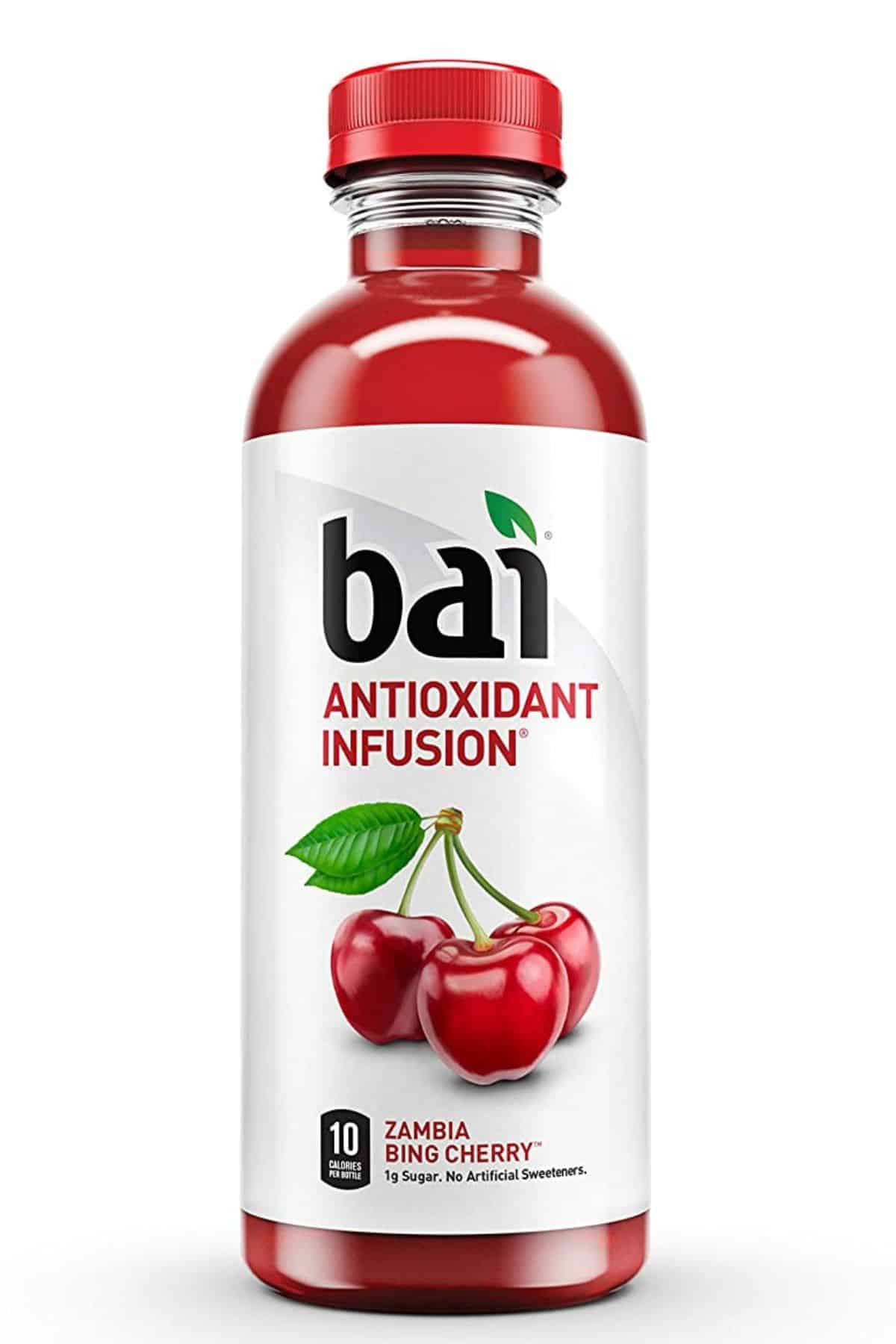
Bai Water Facts
Bai Water is an antioxidant-infused drink that is naturally sweetened and flavored and does not contain added sugar.
It was initially launched as a brand in 2009 before Keurig Dr. Pepper acquired it in 2016.
The founders created Bai Water as an alternative to high-calorie drinks containing synthetic ingredients and processed sugar. The product is considered a healthy alternative to sugary drinks. Bai Water is marketed as a low calorie, healthy beverage with zero grams of sugar.
It is available in a range of flavors with creative names, including:
- Brasilia Blueberry
- Costa Rica Clementine
- Dominica Dragon Passion Fruit
- Ipanema Pomegranate
- Kula Watermelon
- Kupang Strawberry Kiwi
- Malawi Mango
- Panama Peach
- Sumatra Dragonfruit
- Zambia Bing Cherry
There is also a sparkling range available in the following variety of flavors:
- Bolivia Black Cherry
- Jamaica Blood Orange
- Gimbi Pink Grapefruit
- Bogotá Blackberry Lime
- Peru Pineapple
- Lambari Watermelon Lime
- Waikiki Coconut Lime
The manufacturers chose the names to include regions where coffee fruit grows.
Although Bai Water is sugar-free, it contains non-nutritive sweeteners Erythritol and Stevia Leaf Extract and some processed ingredients.
Bai Water Ingredients
Bai Water’s Antioxidant Infusion range’s ingredients include:
- Filtered water
- Erythritol
- Malic acid
- Vegetable and fruit juice concentrate
- Tea extract
- Ascorbic acid (vitamin C)
- Stevia leaf extract
- Citric acid
- Natural flavors
- Coffee fruit extract
- Sodium citrate
Here are some of the main ingredients found in Bai Water Antioxidant Infusion drinks that are intended to help with energy levels without too much sugar.
Please read the information carefully so you can start to decide whether or not Bai Water is healthy for you or not.
Natural Flavors
There is conflicting information about what natural flavors are in food labeling. Because the term has no official definition, manufacturers can use it to describe nearly any type of food.
It’s important to note that some so-called “natural flavors” are produced using artificial processes and products, such as enzyme-assisted extraction, which may include solvents and high heat. Unless a company reveals its methods and the products used therein, it’s impossible to know whether the natural flavors used are healthy and have any nutritional value.
See my related article about AHA Sparkling Water which also uses natural flavors.
Stevia Leaf Extract
Stevia Leaf Extract is one of the sweeteners used in Bai Water.
It is a non-nutritive sweetener up to 400 times sweeter than sugar. It has some health benefits. For example, it may help lower cholesterol, and studies have found that it can help fight some types of cancer.
However, research has also shown that Stevia Leaf Extract could adversely affect your health. At least one study found that even in low doses, stevia could disrupt the gut microbiome.
Erythritol
Erythritol is a sugar alcohol with zero calories, no nutritional value, and no effect on insulin or glucose levels.
It naturally occurs in some foods and is a by-product of fermented wine, beer, cheese, and other foods. Erythritol is a by-product of corn or wheat starch fermentation.
Research has found that consuming sugar alcohols like Xylitol, Sorbitol, Mannitol, and Erythritol can cause digestive distress like gas and cramping and even act as a laxative. Some people are more sensitive to this than others.
Bai’s proprietary sweetener blend includes some of these natural sweeteners.
Coffee Fruit Extract
Coffee fruit is a type of cherry or berry produced by the coffee bean plant. Coffee beans are the pits within the stones inside the coffee fruit. They are roasted and ground to make coffee.
Like the coffee beans inside, coffee fruit has health benefits and contains caffeine. Research has shown many health benefits of moderate consumption, including improved heart health and lowered risk of Alzheimer’s and Parkinson’s disease. It can also help promote brain health and has anti-aging properties!
On the flip side, caffeine is a natural stimulant sometimes used in energy drinks, so it has to be consumed in moderation, and children should avoid it altogether. It can increase your heart rate, raise blood pressure, cause anxiety and restlessness, and stop you from getting a good night’s rest.
It’s important to be aware of the caffeine content of any beverage especially if you experience negative side effects.
You may also like this article on caffeine and weight loss.
Tea Extract
Although the nutrition label doesn’t specify what type of tea extract Bai Drinks contain, plain tea is known as a healthy drink. Research has revealed that all plain types of tea, like green, black, and white tea extract, contain polyphenols that may have anti-carcinogenic effects that can also fight free radicals.
Tea also contains caffeine and flavones. In moderation, caffeine has incredible health benefits, as discussed above. Flavones also has many health benefits, including helping with oxidative stress-related diseases including heart disease.
Fruit Juice Concentrate
Fruit juice concentrate is the fruit with the water removed. It also means that the pulp and skin are removed, which deprives the fruit of fiber.
Fruit juice concentrate is a naturally occurring sugar, but it is still sugar and does not have the added nutritional benefits that whole, unprocessed fruits offer. It is likely what makes up the gram of sugar contained in Bai Water drinks.
Although it provides flavor and sweetness, fruit juice concentrate is empty calories with higher fructose levels. It is processed and not a particularly healthy ingredient, even though it is natural.
Nutrition Pros
Bai Water does not contain any artificial sweeteners or added sugar. Each bottle only has 1 gram of sugar and contains only ten calories.
It is gluten-free and contains antioxidants from the coffee fruit extract and tea extract. Making sure you are properly hydrated is important for overall health.
Nutrition Cons
Bai Water is manufactured in plastic bottles, which are not good for the environment.
On average, a Bai Water beverage contains 55 mg of caffeine, so it’s important not to consume too much caffeine and not to give it to children.
Bai Water contains non-nutritive sweeteners like Stevia Leaf Extract and Erythritol, which can cause digestive distress in some people.
FAQs
Bai Water contains less sugar than many commercially produced beverages and no artificial colors or sweeteners.
It is better than soda and other highly processed, unnaturally flavored, and sweetened or sugar-laden drinks. However, natural food choices are more beneficial and nutritious. It would be better to have green tea if you need a boost in natural energy and antioxidants.
No, it’s only available in plastic bottles. For a more earth-friendly choice, use glass bottles for your beverages. Unlike plastic, you can reuse them many times.
Bai is the Chinese word for “pure.” The company website also states that it is an acronym for “botanical antioxidant infusions.”
Yes, all Bai Water drinks are vegan. They don’t contain milk, honey, eggs, or other animal products.
Don’t Miss These Water Reviews!
Conclusions
Bai Water contains some healthy ingredients like coffee fruit extract and tea extract, and it’s not artificially colored or sweetened, so it’s healthier than many other beverage options.
However, some people are sensitive to sugar alcohols, and some ingredients are processed.
It’s also worth noting that Stevia Leaf Extract can leave a strong aftertaste which may not be to everyone’s liking. Making a hydrating drink at home with real food ingredients is always your best option.
Don’t forget to join my newsletter list to get exclusive clean eating recipes and tips. The newsletter is 100% free with no spam; unsubscribe anytime.
About the Author: Carrie Forrest has a master’s degree in public health with a specialty in nutrition and is studying to be a holistic nutritionist. She is a top wellness and food blogger with over 5 million annual visitors to her site. Carrie has an incredible story of recovery from chronic illness and is passionate about helping other women transform their health. Send her a message through her contact form.
Note: this post is for informational purposes only and is not intended as medical advice. Please consult your healthcare provider for recommendations related to your individual situation.



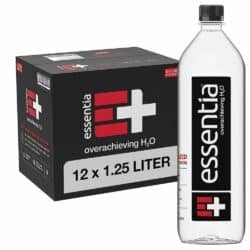
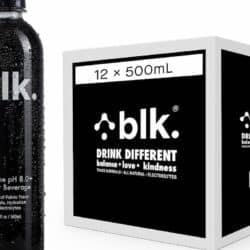




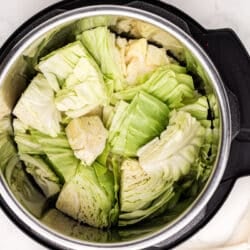
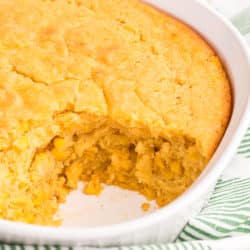

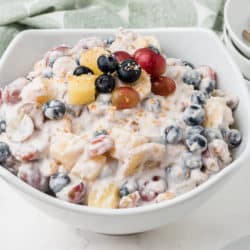








Thank you for this!
Good article
I’m glad you found it helpful!
***BUYER BEWARE!!! Bai just changed their formula on the cherry and other flavors and INCREASED SODIUM from 10mg to 115 mg!!!! At same time, they shrunk the bottle size from 18 oz to 14 oz! I will NEVER buy Bai again as long as I live! It also tastes terrible now, so no big loss! They are crazy to think people will pay $10 a pack for this garbage!! I returned mine for a refund!! This was a DIRTY, criminal move that is not appreciated at all!! I have been a faithful customer for over 10 years and they will surely go out of business with this move. They must have been bought out. Sell outs!!
Agree. Wonder why they stopped. Makes no sense. We are always buying cases of the coconut flavors….not the berry, watermelon…We could get them at Cotsco. I wondered what happened and I miss it. I’ve ried several other kinds of coconut “water” drinks, but nothing close…what a pain.